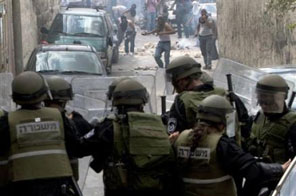Cops, protesters clash in Jerusalem
JERUSALEM: Israeli security forces on Friday clashed with stone-throwing Palestinians near Jerusalem's Al-Aqsa mosque compound as authorities limited access to the flashpoint site sacred to Muslims and Jews.
Eleven officers were injured and two Palestinians arrested, a police spokesman said after the scuffles, which came as Palestinians staged a one-day strike in defence of the compound they claim is threatened by right-wing Jews.
The trouble started in the Ras al-Amud neighbourhood just outside the gates of the Old City following Friday prayers when a dozen masked youths hurled stones at police.
As police moved deeper into the neighbourhood to arrest the youths, residents threw stones, water and even chairs at them.
Authorities said it was an isolated incident and that they may lift restrictions on access to the mosque compound within days if calm prevails.
Several hundred Palestinians performed prayers in the open just outside the Old City after being denied access to Al-Aqsa.
Security forces set up checkpoints around and within the Old City and turned back Palestinians who do not live or work there, witnesses said.
However, they were allowing in tourists and Jews wanting to pray at the Western Wall -- also known as the Wailing Wall -- below the mosque compound.
Most stores in the Old City shut down, though some shop-owners grumbled about the strike. "We need to strengthen our presence in Jerusalem, not weaken it," said sweets-seller Ramdan Abu Sbeeh, 32, who defied the strike call.
Palestinian president Mahmud Abbas's secular Fatah party called the strike "to peacefully protest and to proclaim the attachment of the Palestinian people to their holy places and to Jerusalem as the eternal capital of the independent Palestinian state."
Fatah accused Israeli forces of allowing rightwing Jewish extremists to enter the mosque compound while denying access to Muslims.
Police claimed the Islamic Movement in Israel had incited tension and this week briefly detained its leader, Sheikh Raed Salah, for making "inflammatory statements."
Salah, who previously spent two years in Israeli prison, has repeatedly called in recent days for Muslims to "defend" Al-Aqsa against Israel.
Israel imposed the restrictions on access to the mosque compound following a series of clashes that started late last month. Women could enter freely but the only men authorised to attend Friday prayers were Muslim residents of east Jerusalem or Israel over the age of 50.
In the Gaza Strip, thousands of people on Friday took part in demonstrations called by the territory's Hamas rulers and the Islamic Jihad movement. "The real Al-Aqsa battle has started," said Hamas prime minister Ismail Haniya.
About 600 people took part in a march in the Jordanian capital "in support of Al-Aqsa mosque and protesting Israel's violations in Jerusalem," correspondents said. They chanted "Death to Abbas" and "Death to Israel."
In Riyadh, the head of the six-nation Gulf Cooperation Council, Abderrahman al-Attiyah, meanwhile, called for an immediate lifting of Israel's "siege" and praised the "resistance" of the Palestinians.
The latest surge in tension over the Al-Aqsa compound broke out on September 27 when Palestinians hurled stones at a group of visitors they thought were rightwing Jews.
The visitors were in fact French tourists, according to police, who responded by firing stun grenades.
The Al-Aqsa compound, known to Muslims as Al-Haram Al-Sharif (the Noble Sanctuary) and to Jews as the Temple Mount, has often been a flashpoint of Israeli-Palestinian violence.
The second Palestinian uprising, or intifada, erupted there in September 2000 after






